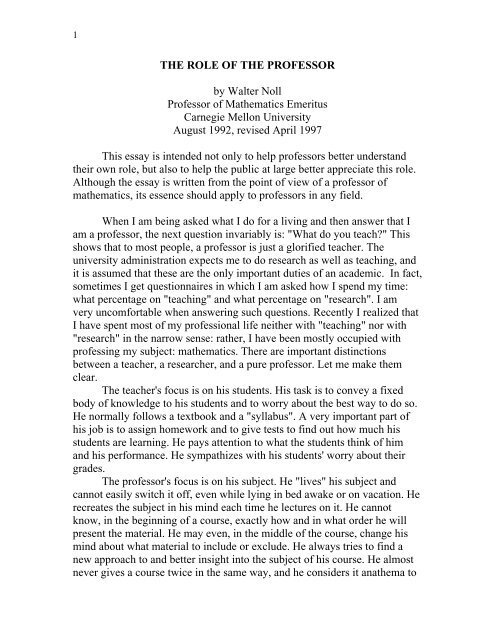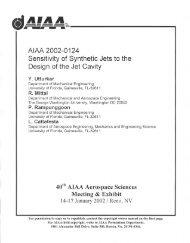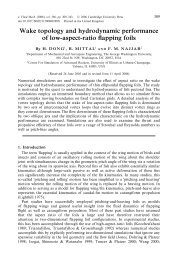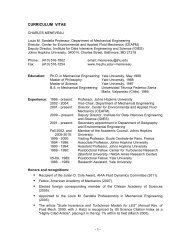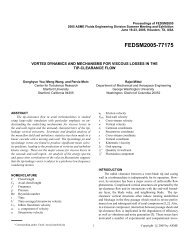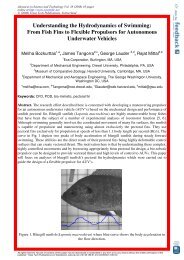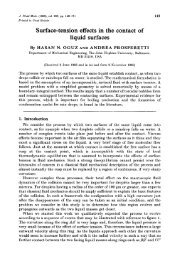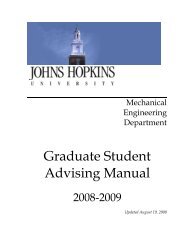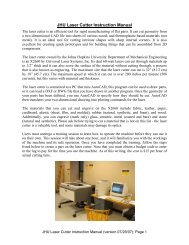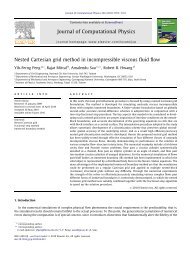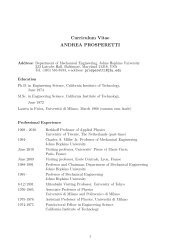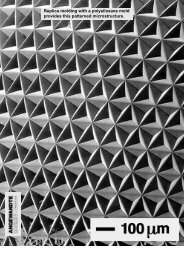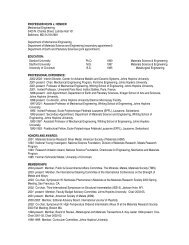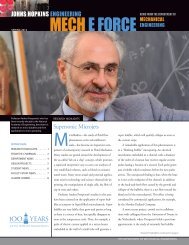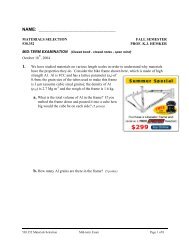THE ROLE OF THE PROFESSOR by Walter Noll Professor of ...
THE ROLE OF THE PROFESSOR by Walter Noll Professor of ...
THE ROLE OF THE PROFESSOR by Walter Noll Professor of ...
- No tags were found...
You also want an ePaper? Increase the reach of your titles
YUMPU automatically turns print PDFs into web optimized ePapers that Google loves.
1<strong>THE</strong> <strong>ROLE</strong> <strong>OF</strong> <strong>THE</strong> PR<strong>OF</strong>ESSOR<strong>by</strong> <strong>Walter</strong> <strong>Noll</strong><strong>Pr<strong>of</strong>essor</strong> <strong>of</strong> Mathematics EmeritusCarnegie Mellon UniversityAugust 1992, revised April 1997This essay is intended not only to help pr<strong>of</strong>essors better understandtheir own role, but also to help the public at large better appreciate this role.Although the essay is written from the point <strong>of</strong> view <strong>of</strong> a pr<strong>of</strong>essor <strong>of</strong>mathematics, its essence should apply to pr<strong>of</strong>essors in any field.When I am being asked what I do for a living and then answer that Iam a pr<strong>of</strong>essor, the next question invariably is: "What do you teach?" Thisshows that to most people, a pr<strong>of</strong>essor is just a glorified teacher. Theuniversity administration expects me to do research as well as teaching, andit is assumed that these are the only important duties <strong>of</strong> an academic. In fact,sometimes I get questionnaires in which I am asked how I spend my time:what percentage on "teaching" and what percentage on "research". I amvery uncomfortable when answering such questions. Recently I realized thatI have spent most <strong>of</strong> my pr<strong>of</strong>essional life neither with "teaching" nor with"research" in the narrow sense: rather, I have been mostly occupied withpr<strong>of</strong>essing my subject: mathematics. There are important distinctionsbetween a teacher, a researcher, and a pure pr<strong>of</strong>essor. Let me make themclear.The teacher's focus is on his students. His task is to convey a fixedbody <strong>of</strong> knowledge to his students and to worry about the best way to do so.He normally follows a textbook and a "syllabus". A very important part <strong>of</strong>his job is to assign homework and to give tests to find out how much hisstudents are learning. He pays attention to what the students think <strong>of</strong> himand his performance. He sympathizes with his students' worry about theirgrades.The pr<strong>of</strong>essor's focus is on his subject. He "lives" his subject andcannot easily switch it <strong>of</strong>f, even while lying in bed awake or on vacation. Herecreates the subject in his mind each time he lectures on it. He cannotknow, in the beginning <strong>of</strong> a course, exactly how and in what order he willpresent the material. He may even, in the middle <strong>of</strong> the course, change hismind about what material to include or exclude. He always tries to find anew approach to and better insight into the subject <strong>of</strong> his course. He almostnever gives a course twice in the same way, and he considers it anathema to
2have to follow a textbook and a syllabus. He is pleased if some studentsfollow and appreciate his efforts, but he finds homework, tests, and grades anuisance. As the famous British mathematician G.H. Hardy put it in his bookA Mathematician's Apology: " I hate 'teaching', and have had to do verylittle,... ; I love lecturing, and have lectured a great deal to extremely ableclasses;..."The researcher's focus is on the discovery <strong>of</strong> new results. He is thecreator <strong>of</strong> new knowledge. His nightmare is to get stuck in his search or tolearn that what he has found has already been discovered shortly before <strong>by</strong>somebody else. Priority is very important to him and will sometimes inducehim to rush into print prematurely.The pr<strong>of</strong>essor's focus, on the other hand, is on understanding, gaininginsight into, judging the significance <strong>of</strong>, and organizing old knowledge. Heis disturbed <strong>by</strong> the pile-up <strong>of</strong> undigested and ill-understood new results. Heis not happy until he has been able to fit these results into a larger context.He is happy if he can find a new conceptual framework with which to unifyand simplify the results that have been found <strong>by</strong> the researcher. Before goinginto print, he lets his ideas ripen. Priority is not an issue for him.I and most <strong>of</strong> my colleagues are teachers and researchers as well aspr<strong>of</strong>essors in the senses described above. Most are very good pr<strong>of</strong>essors, butmany are only mediocre teachers or just adequate researchers. I know onlyone who is very good in all three categories.In the Faculty Handbook <strong>of</strong> this University, under "Criteria forFaculty Appointments", I can find almost nothing that relates to pr<strong>of</strong>essing asubject in the sense described above. Such pr<strong>of</strong>essing rarely gets muchrecognition. Most <strong>of</strong> the rewards in academia go to those who excel inresearch or in teaching. I believe this has had some bad effects.The emphasis on research has led to the well-known "publish- orperish"phenomenon. It has led to excessive specialization. A young facultymember receives promotion because the letters <strong>of</strong> recommendation say thathe is "one <strong>of</strong> the best in his field"; but his field may be so narrow that thereare only ten people in the world working in it, and few outside this smallcircle can understand the "new results" this faculty member has found. Inmathematics, it is easy to get a paper published that contains new results, nomatter how obscure and insignificant. Papers that present important newperspectives <strong>of</strong>ten are rejected because they contain "no new results".In recent years, young faculty members are more and moreencouraged to pay attention to teaching, especially since faculty-courseevaluations have become common. This has made teaching more and more apopularity contest, and it has <strong>of</strong>ten led to lowering <strong>of</strong> standards and grade-
3inflation. Most students do not know the difference between a teacher and apr<strong>of</strong>essor. They expect to be treated in college the same way as they weretreated in high school. They do not know that, in college, they should betheir own teachers.The reasons for the push toward research and teaching alone may be,at least in part, financial. Academics are encouraged to scramble for researchgrants. The granting agencies want proposals that contain strategies forobtaining specific "results". As to the push towards "teaching", the followinganalysis <strong>by</strong> Camille Paglia in the Times Literary Supplement <strong>of</strong> May 22,1992, although unfair to many parents and students, may contain some truth:"As costs continue to rise, [the colleges are] locked into a strictlycommercial relationship with parents. Intellectual matters [take] a back seatto the main issue: providing a 'nice time' for students with paying parents."One may argue that we need only researchers and teachers, and thatpr<strong>of</strong>essors are unnecessary. I do not agree because I believe that thepr<strong>of</strong>essor is the mediator between the researcher and the teacher.Without influence from the pr<strong>of</strong>essor, the teacher's curriculum wouldsoon become more and more outdated and lifeless. Even now, many <strong>of</strong> thepeople who write textbooks for elementary courses in mathematics are hackswho have only a very shallow understanding <strong>of</strong> the subjects they are writingabout. The teachers who select these books <strong>of</strong>ten do not know better, and thesales success <strong>of</strong> these books depends more on the number <strong>of</strong> educationistgimmicks used than on the soundness <strong>of</strong> the content. Academics are notlikely to get merit raises for writing elementary textbooks.Without listening to the pr<strong>of</strong>essor, the researcher would soon becomea narrow specialist who loses all contact with the rest <strong>of</strong> science. The"results" found <strong>by</strong> the researcher, if not critically examined, sorted, and fitinto a coherent framework <strong>by</strong> the pr<strong>of</strong>essor, would be <strong>of</strong> little value.I believe that it is impossible to be a good teacher without being atleast a little bit <strong>of</strong> a pr<strong>of</strong>essor in the sense <strong>of</strong> having some passion for thesubject. The sad state <strong>of</strong> the mathematics education in our secondary schoolsis caused, at least in part, <strong>by</strong> the fact that too few teachers have any suchpassion. I also believe that it is impossible to be a good researcher withoutbeing somewhat <strong>of</strong> a pr<strong>of</strong>essor, because research cannot be good unless itrelates to something larger than itself.


